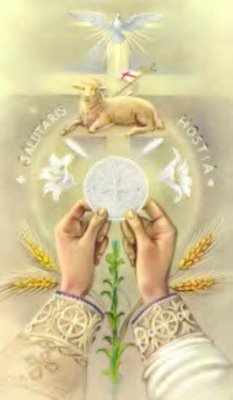The Mass is the complex of prayers and ceremonies that make up the service of the Eucharist in the Latin rites. The Latin name Missa, used at first in a vaguer sense, is the technical and almost exclusive name for this service. People attending a Mass for the first time can be amazed at how complicated the service seems. Even more perplexing is how the community knows when to sit, stand or kneel. Even those of us who are "Cradle Catholics" don't always know why we do what we do. These are signs and actions that we learned by heart since Sunday school and now can do Mass in our sleep, as some of us do. Even the name is confusing sometimes. It's been called the Eucharist, Liturgy, and Mass.
Eucharist comes from the Greek word for thanks giving. The Mass is the ultimate prayer of thanksgiving. Liturgy comes from the Greek for public duty or work, a plan. And lastly Mass, from "missa", meaning sent. At the end of Mass in Latin "Ite missa est" or "Go you are sent." "Missa" only referred to the dismissal, but in time it became the word for the entire ceremony. When it comes to the Mass, what's in it for you?

Every good gift imaginable and infinitely more beyond imagining. Not an end to trouble and sickness, to pain and death, but the greater realization of an accompanying Presence through them. The Mass lets you see how the story ends. And gives you the opportunity to be a part of it, here and now, and in then next life. At the same time life is complex, isn't it? One way we can get more out of the Mass is to learn more about it. Nothing magical, mystical, or theological about that. We begin getting more out of Mass by taking more to Mass. Part of what we can bring is new found knowledge because with that, comes new found appreciation. We appreciate more. Not just the many traditions that have been a part of the development of the Mass. Not just the rich history that has brought it to where it is today. We appreciate how we fit into those traditions and history. We appreciate what we are saying and doing there, and why we are saying and doing those things.
No comments:
Post a Comment